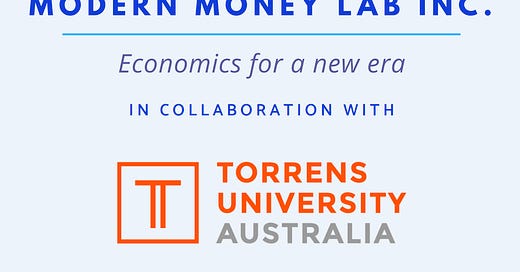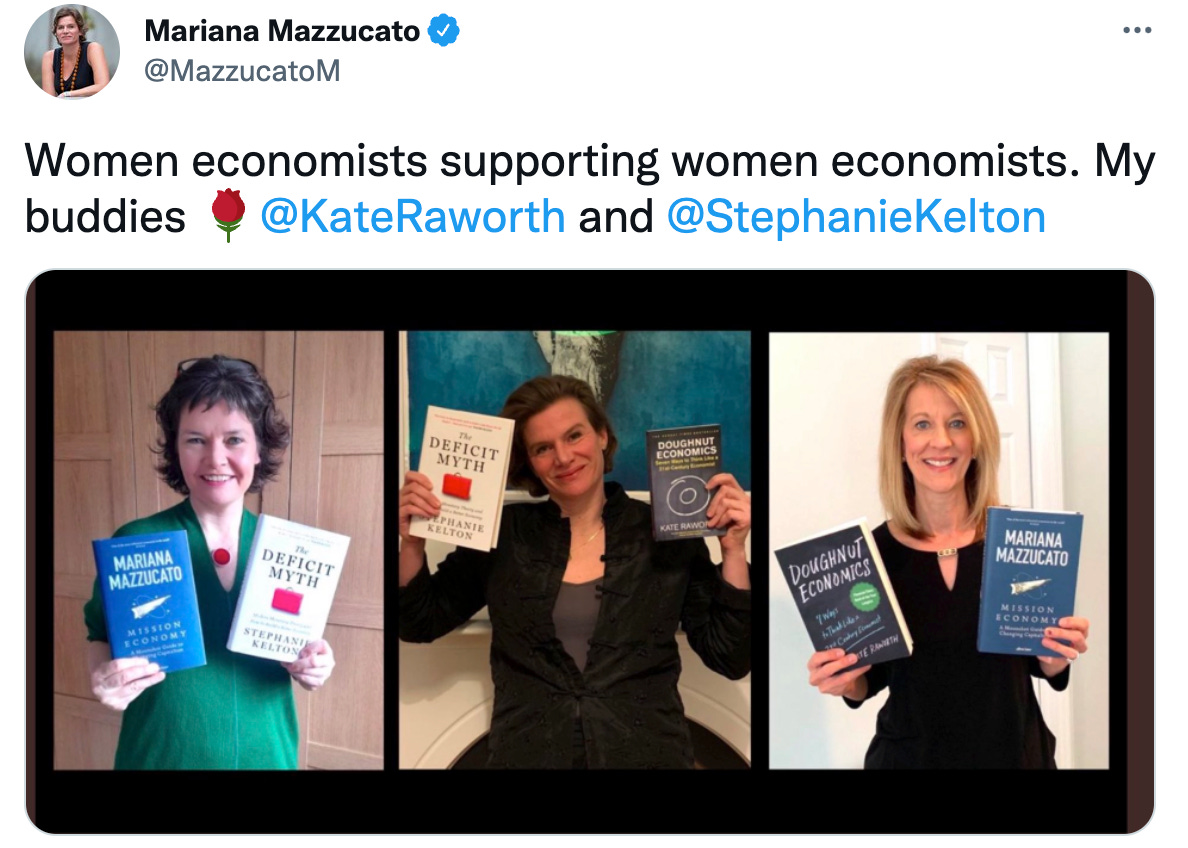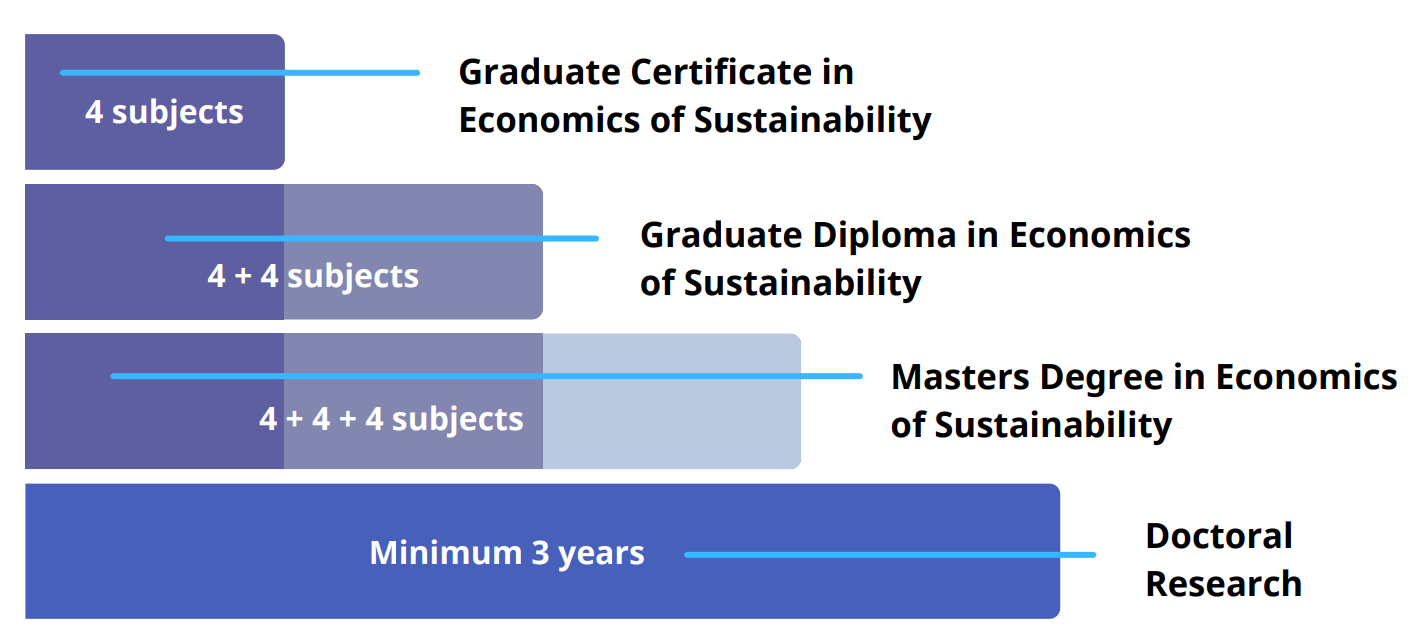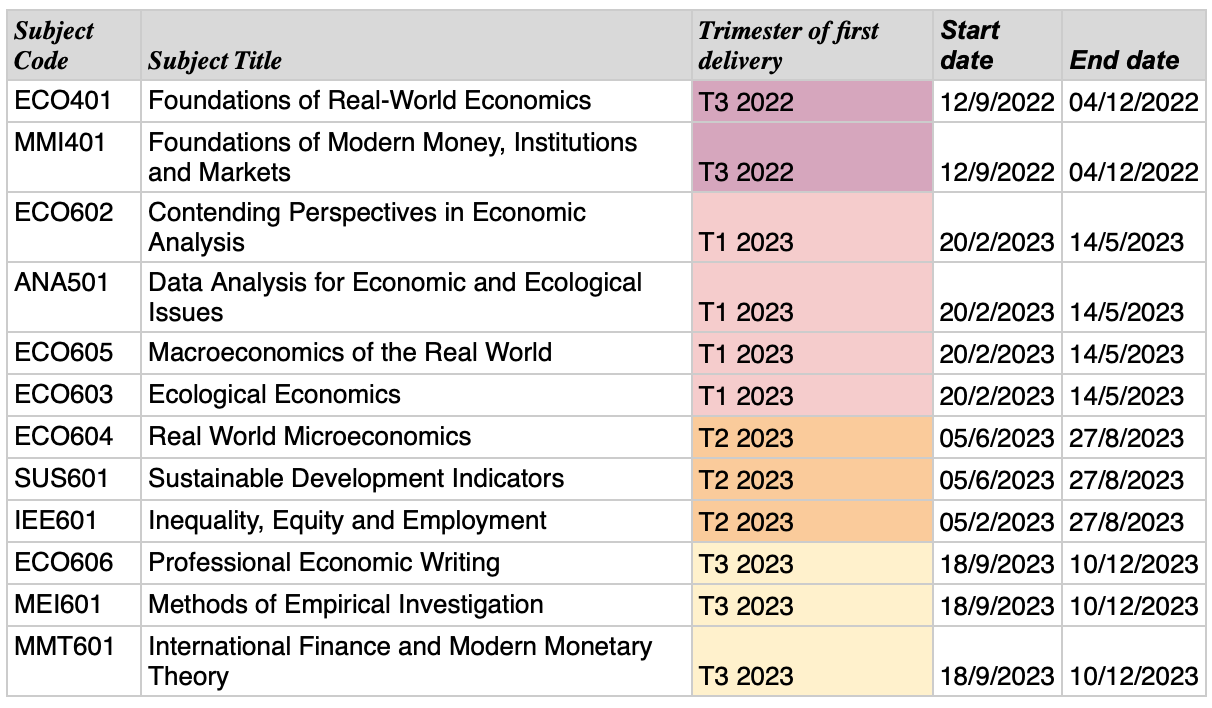Early this morning, I responded to an e-mail from an undergraduate at Florida State University. She’s thinking about pursuing a Master’s degree in economics, and she reached out to ask me for some advice. Here’s part of what she wrote:
[I’m] torn on where is the best school to attend…I wanted some guidance on what environment would be best to engage in some of the topics you research and ones that challenge orthodox economic theory.
I get a lot of inquiries like this, and I always recommend the same handful of programs, starting with the University of Missouri, Kansas City (UMKC), which became the bastion of MMT in the early 2000s, and the Levy Economics Institute, where some of the early developers of MMT currently teach. Today, I included an exciting new option—Torrens University in Australia.
The Torrens program is the brainchild of MMT economist Steven Hail (together with the indefatigable Gabrielle Bond), who’s leading the effort to combine Modern Monetary Theory with environmental and ecological sustainability. If you’re familiar with the work of Mariana Mazzucato and Kate Raworth, you can think of the Torrens program as, in part, a melding together of our work.
But it is much more than that!
There are, of course, lots of places a student can go to take courses in ecological economics. And there are many colleges and universities that offer courses in Modern Monetary Theory. But I know of no program that has integrated the two, on a global level, using a digital classroom.
Another neat feature of the Torrens program is that students can pursue a variety of options, ranging from a graduate certificate to a Ph.D. And, the entire program will be offered exclusively online, so it’s possible to study from anywhere in the world.
I’m going to take part in the online launch event, which will happen on the morning of July 16 in Australia (evening of July 16 in the USA). I’ll share the link when it becomes available.
One of the nice things about the program is that you can take courses without committing to the pursuit of an advanced degree. The University has agreed to set the tuition fees as low as they can feasibly be, and it won’t discriminate between participants from Australia and other countries, which is very rare on postgraduate courses at Australian universities. Right now, it looks like it will cost AUD 3,000 (or about USD 2,000) per course. So the master’s degree would cost about US$24,000.
Full-time study will be available starting in February 2023, but there will be a soft launch in September, with Associate Professor Steven Hail teaching ECO401 and Professor Phil Lawn teaching MMI401. The remaining courses will be available in 2023.
Foundations of Real-World Economics ECO401
In this subject, you will be exposed to the essential features of an economy, both real and financial, and the various actors operating within it. You will become familiar with the true ecological and social/institutional setting of the economy which will challenge the way you perceive and typically analyse an economic problem. Learn about key macroeconomic and microeconomic principles informed by various heterodox schools of thought and why an understanding of these principles is essential for decision making. Throughout the subject, you will be reminded of how framing – that is, the use of words, phrases, and language to describe phenomena – can affect perceptions of reality and the quality of management and policy decisions.
Foundations of Modern Money, Institutions and Markets MMI401
This subject is a self-contained overview of the institutions and markets that form the basis of modern monetary systems. You will be introduced to some of the main concepts and methods used in modern monetary theory. This provides a powerful lens to analyse and interpret economic data and policy decisions. A range of international economies will be considered with reference to the analysis of financial news and current affairs
Contending Perspectives in Economic Analysis ECO 602
This subject is a comparative analysis of the main contending schools of thought in economics, adopting a pluralist perspective throughout. It includes a discussion of the nature of economic enquiry; of what it means to be an economist, and of the shared assumptions which define each school of thought within economics. The intention is to equip students to describe each school of thought as it might be described by one of the leading exponents and evaluate both the main contributions by and criticisms of each school. This is not to argue that all schools of thought are equal, or in some sense right. It is instead to ensure that students emerge with a respectful understanding and ability to critically assess both their own worldview and the worldview of those with a differing perspective to their own.
Data Analysis for Economic and Ecological Issues ANA501
This subject will equip you with the skills necessary to organise, analyse, interpret and make inferences from quantitative data, in order to practically apply these tools to economic and ecological issues. It introduces essential mathematical concepts and applies the fundamental tools of descriptive and inferential statistics. You will analyse and interpret charts and tables, conduct measures of location and dispersion, apply probability theory and the normal distribution, undertake hypothesis testing and confidence intervals, and carry out and interpret regression and correlation.
Macroeconomics of the Real World ECO 605
The subject begins by placing macroeconomics in the context of planetary boundaries, and concludes by encouraging you to examine the implications of ecological sustainability for the macroeconomist. It equips you with the analytical tools that enable you to investigate the determinants of key economy-wide aggregates and to advise on policies designed to influence those aggregates over time. You will apply a Post-Keynesian framework, based on institutional realism and avoiding unrealistic assumptions. You will contrast this with the neoclassical approach which has been so influential in recent decades but is now increasingly under challenge. Modern monetary theory will be used to develop and justify appropriate policy advice within the Post-Keynesian framework.
Ecological Economics ECO 603
This subject examines the relationship between human economies and the ecosphere (natural environment). Beginning with an image of the economy as a dependent subsystem of the ecosphere, you will be introduced to the notions of maximum sustainable scale and optimal scale; the steady-state economy; and the distinction between ‘economic’ and ‘uneconomic’ growth. You will be exposed to economic issues central to the sustainable and efficient use of natural resources, which will allow you to make better management and policy decisions. Learn how to measure environment costs and employ benefit-cost analysis to evaluate prospective projects. Throughout the subject, you will be reminded of the enabling role of governments and how international economic factors can impact sustainable development.
Real World Microeconomics ECO 604
Real-World Microeconomics deals with the economics of individual components of the larger economy. The subject draws on social psychology to describe consumer behaviour in a realistic way. It also draws on ecological economics and Post-Keynesian price theory to represent business behaviour. Following an examination of interacting demand and supply factors, you will be apprised of actions that governments can take to overcome market failures, especially those relating to public goods, externalities, sunk costs, and anti-competitive business behaviour
Sustainable Development Indicators SUS 601
This subject will introduce a suite of indicators to assess the sustainable development performance of jurisdictions at all levels. Upon making the distinction between ‘ends’ and ‘means’, you will examine the sustainable development concept which calls for separate sustainability and development indicators. You will consider what might serve as summary and panel indicators, and justify their appropriateness as indicators to inform decisions. Throughout the subject, you will examine the worthiness of well-established and newly emerging indicators and evaluate the performance of nation states and other jurisdictions.
Inequality, Equity and Employment IEE 601
In many countries inequalities of income and wealth have increased significantly over the past 40 years. In this subject you will explore the measurement and history of income and wealth inequality and the history of economic thought on the causes of inequality. Interrogate a variety of perspectives on the impact of inequality and relative poverty on well-being, and the measurement and history of underemployment. You will assess the potential impact of underemployment and insecure employment on well-being and investigate comparative institutional structures and policy regimes and inequality across modern societies; and the future of work and inequality.
Professional Economic Writing ECO 606
In this subject you will learn and apply the principles of effective economic writing and the communication of economic ideas, producing a short piece of economic journalism. You will then discuss seminal peer-reviewed academic papers on modern monetary theory and ecological economics. Finally, you will conduct a brief and directed literature review relating to a specific research topic relating to modern monetary theory or ecological economics.
Methods of Empirical Investigation MEI 601
This subject builds on data analysis to provide the foundations required by professional economists when investigating and quantifying economic phenomena, testing hypotheses, or interpreting work of professional colleagues. You will undertake simple linear regression; multiple linear regression; hypothesis tests and confidence Intervals in regression analysis; nonlinear regression; regression with panel data; regression with a binary dependent variable; and instrumental variables regression. The additional issues arising in time series regression will not be covered.
International Finance and Modern Monetary Theory MMT 601
International financial flows, exchange rate volatility, and a variety of financial crises have had major impacts on national and regional economies and on the global economy for many decades. This subject provides you with an understanding of the mechanics of the foreign exchange market and of international financial flows. It draws on a variety of approaches to explain how international investment decisions are made and on the driving forces behind changes in market exchange rates over time. You will identify three regular trigger points for financial crises, examine how they are linked, and apply them to better understand historical and contemporary crises. The significance of exchange rate policy for the freedom of action of governments with respect to fiscal and monetary policy will be explored. You will examine the history of the European monetary union and critique the design and sustainability of the eurozone. Formal stock-flow consistent modelling will be introduced, allowing you to construct your own simplified stock-flow consistent macroeconomic model and to interpret and evaluate a more sophisticated model with applications to international finance.
They’re not accepting formal applications yet, but you can click here if you’d like to register your interest in the program.







"Learn how to measure environmental costs and employ BENEFIT-COST (emphasis added) analysis to evaluate prospective projects."
Bravo! I may have to get out more, but this is the first time I've seen the well-worn "cost-benefit" analysis mantra reversed. This switcheroo makes perfect sense. A sensible, well-planned and executed project will have palpable benefits. The "cost" is usually just money--meaning a larger federal deficit. But if our economy has unused spare capacity, who cares about the deficit? It's just money! Claw back taxes from the rich to reduce that deficit if it makes you feel better, but it isn't really necessary if the project doesn't trigger inflation.
Let's first figure out how any project can benefit society, and only AFTER we've done that should we decide if the price tag is so high that it will be inflationary and thus counterproductive. If we always consider the cost first, we get intimidated by the deficit hawks and paralysis sets in.
I know it's difficult to think of "Costello and Abbott" or "Andy and Amos," but it would be really cool if MMT could rearrange the lexicon so that "Benefit-Cost" analysis becomes the coin of the economic realm. Well done!
Thank you so much for sharing our courses, Stephanie! To understand ecological economics is to know what needs to be done to secure a liveable planet, and understanding MMT gives us the tools to achieve it. The two together are incredibly powerful, and I’m honoured to play a part in this project.